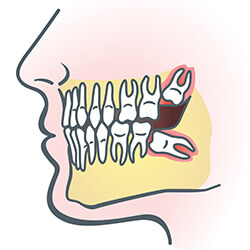Wisdom Teeth
Wisdom Teeth Emergencies
About 85% of people will need to have their wisdom teeth removed. What this means is that there are still people who keep their wisdom teeth and have no problems with them. If your wisdom teeth don’t create any problems for you before the age of 30, chances are they won’t cause any problems. However, this isn’t true for everyone. Sometimes wisdom teeth can still be problematic even if they were found to be healthy at one point. Wisdom teeth emergencies shouldn’t be ignored as they will likely continue to escalate. If you have a wisdom teeth emergency, contact us today.

Wisdom Teeth in Centreville, VA
Wisdom teeth are types of molars found in the very back of your mouth. They usually appear in the late teens or early twenties, but may become impacted (fail to erupt) due to lack of room in the jaw or angle of entry. When a wisdom tooth is impacted, it may need to be removed. If it is not removed, you may develop gum tenderness, swelling, or even severe pain. Impacted wisdom teeth that are partially or fully erupted tend to be quite difficult to clean and are susceptible to tooth decay, recurring infections, and even gum disease.
Wisdom teeth are typically removed in the late teens or early twenties because there is a greater chance that the teeth’s roots have not fully formed and the bone surrounding the teeth is less dense. These two factors can make extraction easier as well as shorten the recovery time.
In order to remove a wisdom tooth, your dentist first needs to numb the area around the tooth with a local anesthetic. Since the impacted tooth may still be under the gums and imbedded in your jaw bone, your dentist will need to remove a portion of the covering bone to extract the tooth. In order to minimize the amount of bone that is removed with the tooth, your dentist will often “section” your wisdom tooth so that each piece can be removed through a small opening in the bone. Once your wisdom teeth have been extracted, the healing process begins. Depending on the degree of difficulty related to the extraction, healing time varies. Your dentist will share with you what to expect and provide instructions for a comfortable, efficient healing process.
Wisdom teeth extractions
Extractions can range from a single tooth, to removing all four wisdom teeth at once. Based on the preference of the doctor and/or the patient, a local anesthetic could be used to numb the areas where the teeth will be extracted. Others will prefer to go under a general anesthetic so that they will be sedated during the procedure.
In order to reveal the tooth, gum tissue around the wisdom tooth is cut open. The tooth is then gripped tightly and wiggled back and forth in order to loosen it and lift it out of the gums. In some cases, the tooth is so severely impacted that it cannot be simply lifted out but needs to be broken up into pieces first before it is removed. Sutures may be needed to close the area depending on the extraction site and the incision, for which soluble suture which dissolve on their own are the best option.
